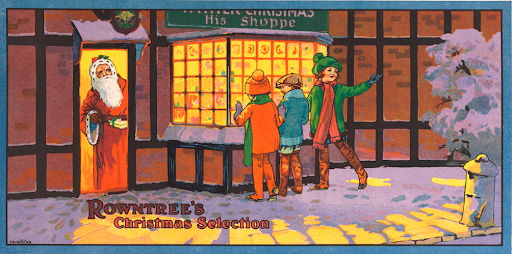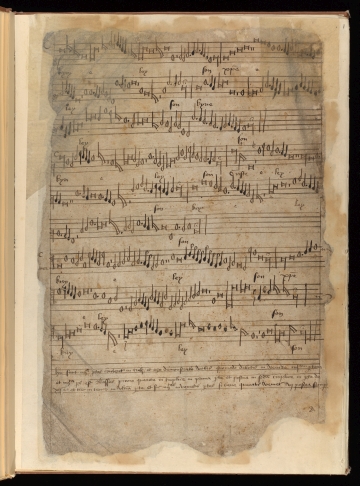Borthwick Newsletter - December 2020
Posted on 27 November 2020
December in the Archives - delve into our catalogues with this month’s featured description
Photographs of Christmas at the York Blue Coat charity school, including carol singing, catching the turkey, making Christmas puddings, Christmas dinner, Father Christmas and presenting the Wilson shilling, 1930s [YCT/BCS/7/9]
What’s new?
In November the Borthwick, like the rest of England, returned to lockdown, meaning we had to close our searchroom to the public once more, although we were still able to accommodate University of York staff and students by prior appointment for teaching and learning. In that time staff continued to work onsite behind the scenes, cataloguing archives, fulfilling copy orders, and answering enquiries.
Inspired by lockdown, we shared a list of resources we have made available for free via our twitter account. One of the most popular remains our guide to reading sixteenth and seventeenth century handwriting, which you can download on our website. If you’ve ever felt daunted by the ‘Secretary Hand’ widely used by Tudor and Stuart scribes, fear not! Our guide features full colour images from our archives with matching transcripts, letter guides, and tips on recognising common abbreviations.
We’ve also added another episode of the Borthwick podcast ‘Out of the Archives Box’. This time Project Archivist James Neill delves into the history of Alcoholics Anonymous and how their pioneering approach to addiction made the journey from Ohio in the United States to Yorkshire. James is currently cataloguing the archive of Alcoholics Anonymous UK and you can see an in-progress version of the AA catalogue on Borthcat.
With only a few weeks to go until Christmas you should also keep an eye out for a special festive edition of our podcast - there will be more details coming soon on our Twitter and Facebook pages!

New Accessions
Since the new lockdown the Borthwick has been closed to new accessions, but just before it began we took in an additional accession from the combined parish of St Helen, Stonegate, and St Martin, Coney Street, in York. You may not be aware that the Borthwick is the designated place of deposit for parish records in York and around 20 miles around the city. This means that as well as looking after the historic records of over 200 parishes, we also continue to collect new records from them - meaning our parish archives stretch from the 13th century to 2020! The new addition includes records relating to the upkeep of the church buildings, the famous St Martin’s clock over Coney Street, and the minutes of the Parochial Church Council. You can see all our parish record collections here on Borthcat. Look on the right of the description to see the download link for the parish finding aid.
New Catalogues
Recently we’ve completed retroconversion of the Mirfield Papers, the archive of the Anglican religious order The Community of the Resurrection. Founded in 1892 the community has been based at Mirfield in West Yorkshire since the 1930s. Contrary to the withdrawn life many might expect of a religious order, the Community of the Resurrection has been active in lay ministry and education and has maintained a strong commitment to social action throughout its history. In 1902 it opened a theological training college for ‘men without means’. It also ran schools in Africa and the community’s members include Trevor Huddleston who earned the name ‘Makhalipile’ or ‘dauntless one’ during his time in South Africa for his very public opposition to apartheid.
We’ve also added indexes of pupils at Blue and Grey Coat Schools in York to our existing catalogue. These indexes were compiled from several different sources, notably minute books of the committee who ran the schools and oversaw admissions, and they not only record the names, parishes and dates of birth or baptism for the pupils, some of them also give rather candid opinions of the children’s character and behaviour too! The entry for William Coverdale of St John’s, Micklegate, admitted in 1837 at the age of 9, records him as having been expelled ‘for repeatedly running away’, a ‘very bad’ boy with a ‘worse mother, by whom he was encouraged’. The next year saw an entry for John Cooper of St Michael le Belfrey, a ‘great thief not possessing one good quality’ according to the committee. It was not all bad school reports however. The entry for William Morritt, admitted in 1844, described him as being ‘of good ability and honest’ if ‘rather eccentric’, and one notable success story is that of James Dall, admitted in 1850, who the committee approved of as being ‘of superior capacity and well behaved’. Dall later settled in Nelson, New Zealand, where he became a noted botanist with a successful horticultural business.
Number of archival descriptions on Borthcat on 1st December 2020: 72,864
Borthwick Archives in the Media
To mark the beginning of Disability History Month on the 18th November we tweeted about one of the most interesting and unusual wills we hold at the Borthwick, the 1833 will of Starkie Jennings of Haworth. Starkie had suffered a ‘stroke of paralysis’ but was able to make his testamentary wishes known by the use of drawings of his daughters and his properties. The tweet attracted a lot of attention and we were thrilled when barrister and historian Barbara Rich wrote a fascinating blog entitled “Excepting one bed and one Bible” which examines the will, its contemporary legal context and the lives of Starkie Jennings and his daughters.
Meanwhile if you’re looking to do your own research, Professor Sarah Rees Jones of the Department of History at the University of York has produced a handy YouTube video on how to research local history in the North of England using the registers of the medieval Archbishops of York. The registers, which form part of the vast Diocesan Archive at the Borthwick, are being indexed as part of the ongoing Northern Way project, which you can read more about on our website.
Archive of the Month: Music Fragments

What is it?
A collection of partial music manuscripts, many of which were found in the bindings of books in the York Diocesan Archives.
Where can I find it?
The Music Fragments archive catalogue can be viewed on Borthcat and the fragments can be viewed in the Borthwick searchroom by request.
Why is it Archive of the Month?
The survival of fragments of rare medieval manuscripts inside the bindings of later books (both manuscript and printed) are true ‘hidden treasures’ of the archive and library world. When medieval manuscripts became damaged or worn, the materials were too valuable to merely discard but rather were trimmed and reused to line book bindings, to reinforce stitching in a binding, as fly leaves, or even to wrap around other documents. When the books or documents come to be repaired centuries later, these fascinating additions are rediscovered by conservators and archivists - and are usually removed and preserved. This process of recycling has led to the preservation of parts of manuscripts that would otherwise have been lost in their entirety, making them enormously valuable artefacts.
The Music Fragments archive at the Borthwick includes 22 paper leaves known as the ‘York Masses’, a unique set of musical pieces written for the Roman Catholic Mass and dated to around 1500. They were first identified by Canon J.S. Purvis, archivist to the Archbishop of York and later the first Director of the Borthwick Institute, and they came to us with the rest of the Diocesan Archive in 1953. The fragments show evidence of annotations, corrections and crossings out, indicating that they were part of a working document used by contemporary musicians and singers. In 2007 a detailed analysis of the York Masses, with musical notations for all the surviving pages, was published by the York Early Music Press, edited by Lisa Colton. You can read it for free online.

